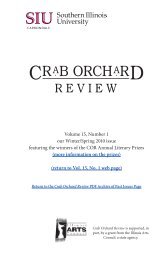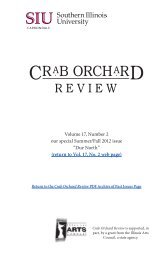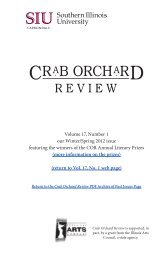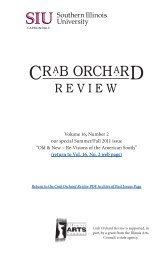Crab Orchard Review Vol. 12, No. 2, our
Crab Orchard Review Vol. 12, No. 2, our
Crab Orchard Review Vol. 12, No. 2, our
Create successful ePaper yourself
Turn your PDF publications into a flip-book with our unique Google optimized e-Paper software.
228 ◆ <strong>Crab</strong> <strong>Orchard</strong> <strong>Review</strong><br />
Book <strong>Review</strong>s<br />
of the chin, looks into the eyes, looks in,<br />
says, I accept these things as gifts,<br />
then, okay, you’re who I’m writing for,<br />
far off, or near; who I’m here biting my lip<br />
to be clear to. Yes, you. Yes, you.<br />
—<strong>Review</strong>ed by Elisabeth Meyer<br />
McFee, Michael. Shinemaster. Pittsburgh, PA: Carnegie Mellon<br />
University Press, 2006. 64 pages. $14.95.<br />
One of the best qualities of Shinemaster, the follow-up volume for<br />
2001 Roanoke-Chowan Award winner Michael McFee, is that it has<br />
a little something for everyone. Shinemaster is a collection of poems<br />
that demonstrates how mundane events can segue into universal,<br />
timeless themes. “Spitwads,” “Belching,” “Skin,” “Kissing,” “Sneezing,”<br />
“Vineswinging,” and “Tubs” are a few of the commonplace items and<br />
occurrences from which McFee launches his poetry. McFee’s volume<br />
surprises and rewards the reader at every turn; from formal facility to<br />
theoretical savvy, McFee is a poet worth listening to.<br />
In this postmodern, anarchic age, McFee’s formal attention is<br />
particularly pleasing to see. While eschewing traditional form for the<br />
greater part of Shinemaster, his structural care is nonetheless evident.<br />
“The Tree Man,” for instance, is laid out in a series of couplets; laid<br />
lengthwise like logs, the formal arrangement evokes the wooden<br />
content well.<br />
“The Culvert” is another example of McFee’s sensitivity to form.<br />
This poem is about a boyish dare and rite-of-passage that reinforces<br />
themes of risk, death, and birth upon which McFee continually riffs.<br />
The young speaker crawls through a “putrid tube / whose diameter was<br />
barely greater than y<strong>our</strong> body.” McFee’s masterful touch is to emulate<br />
the claustrophobic moment with seventeen equally constricted lines.<br />
Without a stanza break, this poem effectively simulates the tight<br />
quarters of its semantic content. Here, as in many of the other poems,<br />
McFee opts for a single mark of punctuation at the end, a choice that<br />
leaves the reader as breathless and hurried as the boy in the poem who<br />
hauls his “filthy self back into reborn morning.”<br />
In “Vineswinging,” McFee again relates a boyhood memory. Here,<br />
however, the focus is not on the form. In the poem, the speaker and






